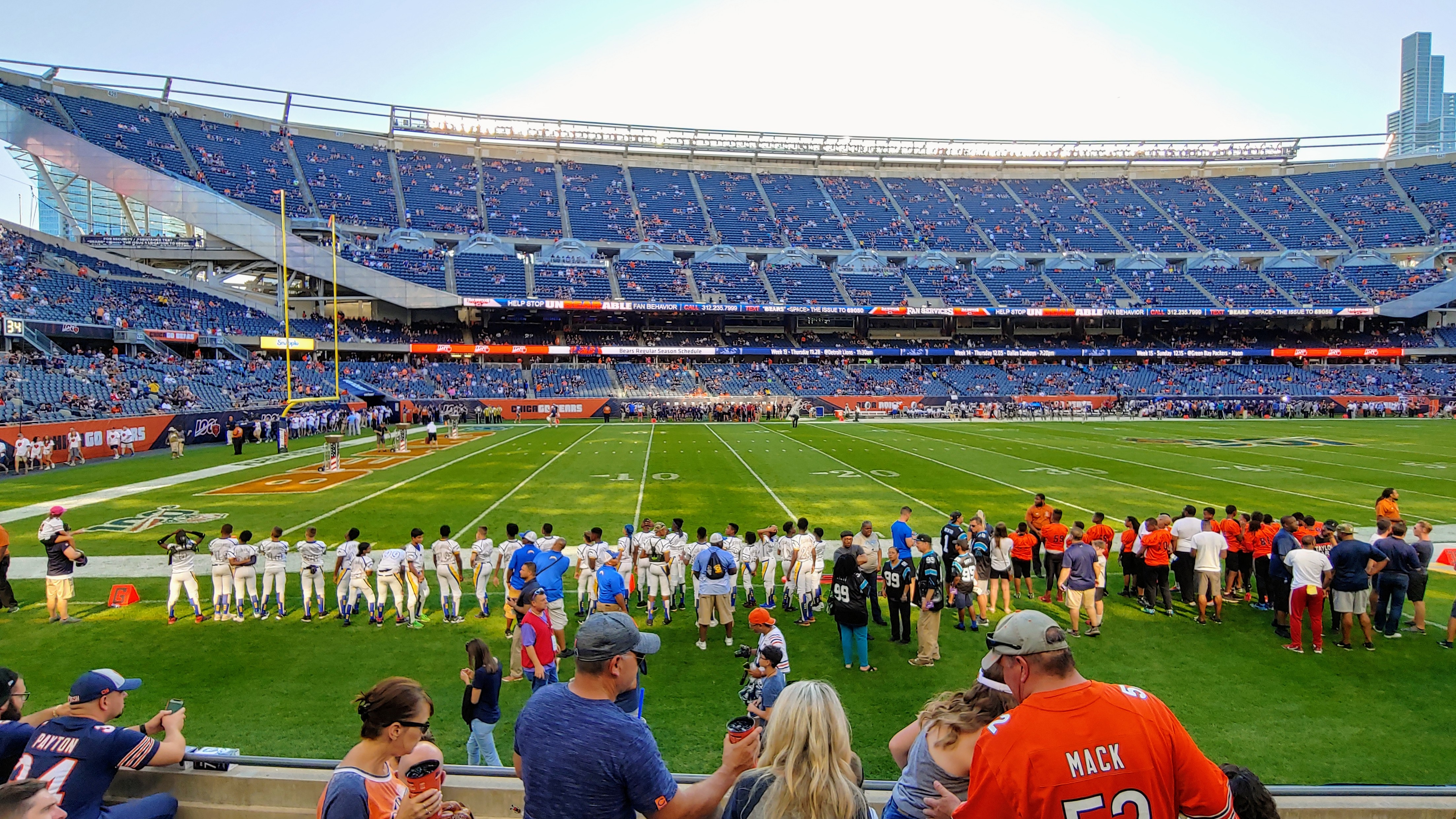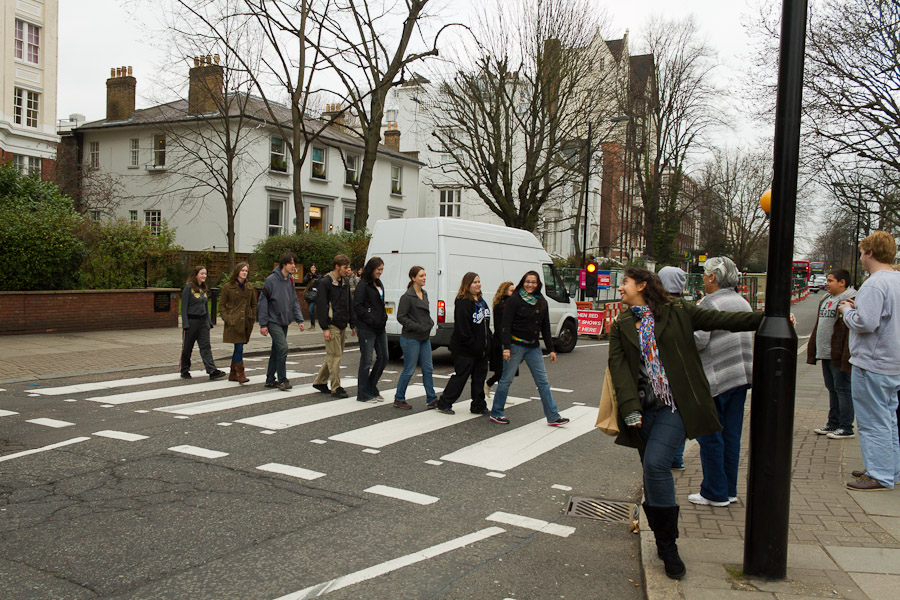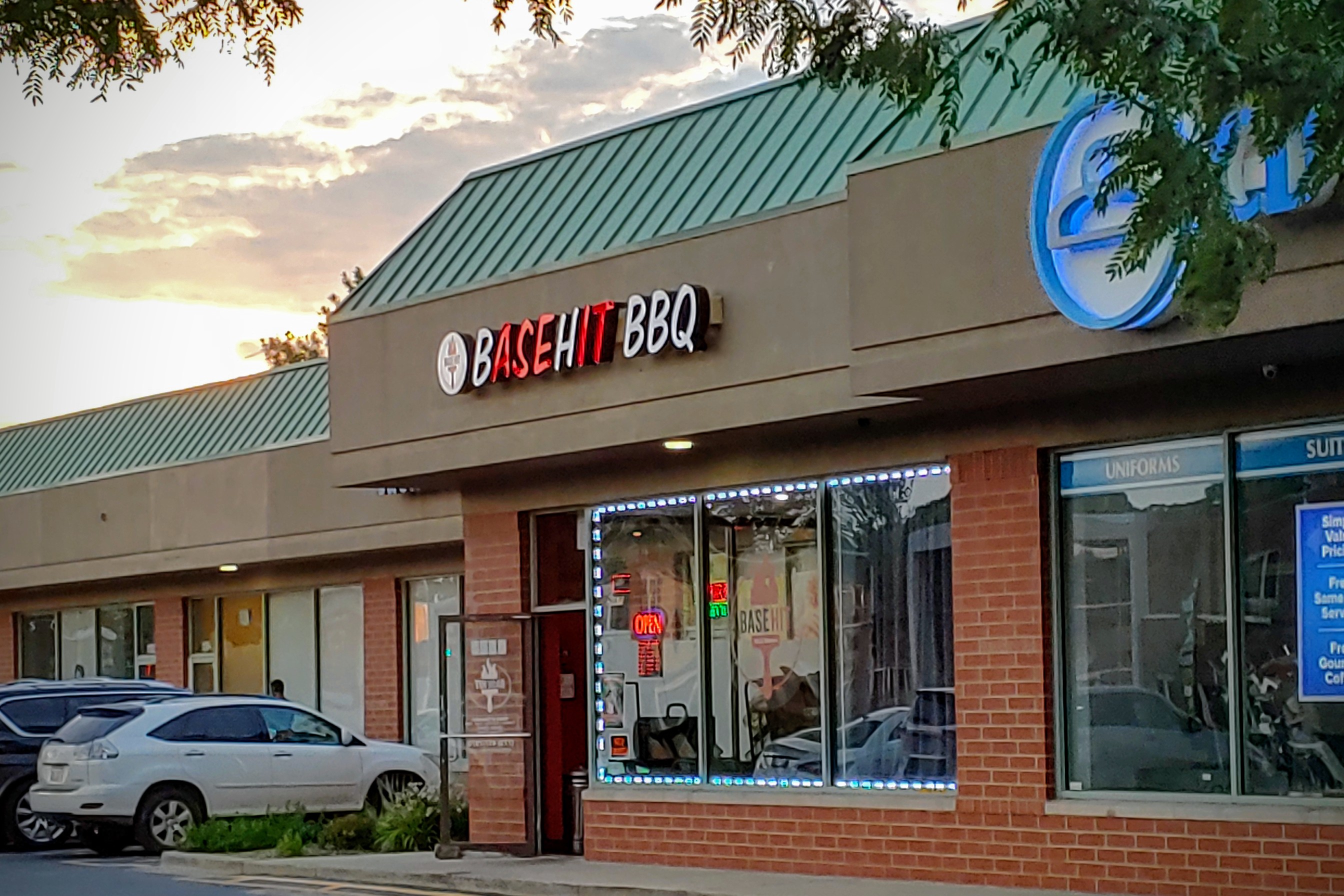Yesterday, I attended my first professional NFL game* at Chicago's Soldier Field. I can't complain about the view:

The Bears did not play their best, but I had a great time at the game. And after, I got to walk in sticky August weather with a stadium's worth of people to the Red Line, which everyone loves after 11pm.
I'm being unfair. The tickets came from last April's Apollo After Hours, via a generous donation from one of our members and a lucky bid on my part. And now, I've been to a professional NFL game. And don't have to go to another one. (More on that, later.)
* "Professional football game" means something different in every country on earth; so I used the construct "professional NFL game" to distinguish between the US National Football League and what 7 billion other people call "football."
That Sgt Pepper taught the band to block a street in London:
It was on August 8, 1969, that the band snapped the photo that would change Abbey Road’s future forever. The following month they would release an album named after the northwest London street where it had been recorded, and that album’s iconic cover would seal the street’s fate. A photo of the Fab Four crossing the street in tidily-arranged profile made Abbey Road the site of the most famous crosswalk in the world.
In terms of traffic management, it’s been downhill ever since.
Getting the pose right is not easy. When the original photo was taken, police were on hand to stop traffic while photographer Iain Macmillan scaled a step ladder to get the right angle. Visitors ever since, by contrast, have had to contend with the fact that this quietly opulent street is actually quite busy with traffic, ever complicated by the daily gauntlet of posing fans.
I confess, I visited the famed zebra crossing in 2012. The actual Abbey Road Studios building is just behind it:

A diverse flock this afternoon:
Your coder will now resume coding his previously-coded code.
First, New York Times film critic A.O. Scott takes a second look at the 1999 film Election:
The movie has been persistently and egregiously misunderstood, and I count myself among the many admirers who got it wrong. Because somehow I didn’t remember — or didn’t see— what has been right there onscreen the whole time.
Which is that Mr. M is a monster — a distillation of human moral squalor with few equals in modern American cinema — and that Tracy Flick is the heroine who bravely, if imperfectly, resists his efforts to destroy her. She’s not Moby-Dick to his Ahab so much as Jean Valjean to his Inspector Javert.
Second, with Lake Michigan at record-high water levels for the second month in a row, several of Chicago's beaches have disappeared:
This year, the buoyant water has swallowed at least two Chicago beaches entirely and periodically closed others. It has swiped fishermen from piers, swimmers from beaches and submerged jetties, creating hazards for boaters. It has flooded heavily trafficked parts of lakefront bicycle and pedestrian pathways, leaving some stretches underwater and others crumbling.
But perhaps the most worrisome aspect of this summer is that these perils have occurred while the lake has remained mostly calm.
“Fall is the time of the year when wave conditions are historically the most severe on the Great Lakes,” said David Bucaro, outreach manager at the U.S. Army Corps of Engineers Chicago District. “We’re at a calmer period right now. There’s been some summer storms. But that October, November time period is when we really experience historically the most powerful coastal storms. That’s the conditions that we’re monitoring and are most concerned with.”
Should be fun this fall.
Next, writing for the LA Times, Rebecca Wexler points out that data-privacy laws giving law enforcement the power to snoop on electronic devices is deeply unfair to defendants for an unexpected reason:
Social media messages, photo metadata, Amazon Echo recordings, smart water meter data, and Fitbit readings have all been used in criminal cases. The new laws would limit how defendants can access this key evidence, making it difficult or impossible for defendants to show they acted in self-defense, or a witness is lying, or someone else is guilty of the crime.
The California Consumer Privacy Act, which was approved in 2018, allows law enforcement officers to obtain data from technology companies and prohibit those companies from immediately notifying the person they are investigating. Such delayed notice may be necessary to investigate someone who is dangerous or likely to destroy evidence or flee. But the law does not give defense investigators the same right to delay notification to witnesses or others — who might well pose a threat to the defendant — when they subpoena data from tech companies as part of the defense’s case.
I will now rejoin a long-running data analysis project, already in progress.
The Show-Me State recently passed a law creating the specifications for Missouri Bourbon:
According to House Bill 266, signed on Thursday, July 11, any whiskey labeled as Missouri bourbon must not only meet the federal standards for bourbon, but also be mashed, fermented, distilled, aged and bottled in the state; aged in oak barrels manufactured in the state; and—beginning January 1, 2020—made with corn exclusively grown in the state. The law goes into effect on August 28.
The Missouri Craft Distillers Guild, which formed in 2018 and now has 35 members, pushed the measure heavily. “The whole point of the bill was to tie agriculture and tourism together in Missouri,” says Don Gosen, owner of Copper Mule Distillery and a member of the Guild. “Being able to make a high-class bourbon and make it truly a Missouri product—not just made in Missouri, but made from Missouri raw materials.” The bill, which was sponsored by Rep. Jeff Porter of Montgomery City and signed by Gov. Mike Parson, was originally authored by Gosen with later modifications and input provided by the Craft Distillers Guild and other stakeholders.
Well, OK, when the first examples come out in a couple of years, I'll try it.
Queued up a few articles to read after work today:
Now, off to find food, then back to the mines.
Via Bruce Schneier, this is literally* a thing:
The book opens with Massimo working in his combination laboratory and server farm; we know it's ironclad because of the required thumbprint and biometrics scan, but we also know it's classy because it's in an old wine cellar beneath his family villa outside Milan. Plus, he has three screens, so you know he's a serious cybersecurity hacker man.
Nat is a 20-something who lives a poverty-driven boho life. Massimo—who is Mr. Cyber—is, in her eyes, a "sleek, lean, sex-on-legs stud" who looks nothing like the stereotypical tech billionaire. And the chemistry between them ignites as he drags her back to his server room and tells her to do some... penetration testing.
She demurs.
Six chapters in. I am convinced that this book was written by a Harlequin Markov bot.
I may not add this to my book list just now. But at least I know it's out there...
*Yah, sorry. That's "literally" twice.
I had the opportunity yesterday to get some ribs from my favorite vendor at this year's Ribfest. Base Hit BBQ opened their restaurant in March after five years of catering and festival cooking. (They framed their Chicago Defender review.)

Their thermostat showed 33°C inside the small two-table eating area, but that isn't why I was sweating. Their hot sauce lives up to its name, and they use a tasty spicy rub on their bones. Excellent quality meat, good smoke flavor, and all chopped up for easy eating when served.
At Ribfest they had more caramelized sauce than in their brick-and-mortar location, but that's because they leave the sauce off while smoking and grilling the meat. (Ribfest has certain constraints.) They were still so tasty that I managed to eat a full slab and one of the bread slices they added.
My only complaint: they don't have a bathroom and they don't provide wet-wipes. So after stuffing all those ribs into my belly, it took some MacGuyvering with paper napkins and hand sanitizer to get to a point where I felt I could touch any surface of my car.
I'll go back. But I think the next slab I have will be from my second-favorite vendor from this year, Fireside Grill.
In other news, one of Chicago's oldest pizzerias is closing today. Father & Son Pizza in Logan Square will cease operations after 72 years.
The President's properties have fallen on hard times, thanks mostly to the President's politics and his childrens' incompetence:
The PGA Tour pulled out of Doral during the 2016 campaign after the World Golf Championship had trouble finding a sponsor. Cadillac had quit; speculation abounded that no new brand wanted to be associated with a Trump golf course. So the PGA Tour pulled up roots and moved elsewhere: A five-decade tradition of hosting the event at the course, started in 1962, came to an end. NASCAR also pulled out of an event planned for Trump Doral, and business began to dry up at the course.
According to tax documents reported by the Washington Post, the club’s net operating income dropped 69 percent between 2015 and 2017. During a 2017 visit, the Miami Heralds’ sports columnist noted barely any golfers on the course and listened forlornly to crows and the wind whistling. “I went there and it was so empty you could shoot a machine gun,” another golf writer, Rick Reilly, told Rolling Stone.
If Michael Cohen was right when he said Trump ran for president as a “marketing exercise,” then the experiment has massively backfired.
But hey, if you want, you can sign up for the "caddy girl" auction at the Doral's upcoming strip-club event this weekend.